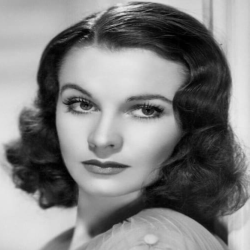
Vivien Leigh
British Actress
| Date of Birth | : | 05 Nov, 1913 |
| Date of Death | : | 08 Jul, 1967 |
| Place of Birth | : | Darjeeling, India |
| Profession | : | Actress |
| Nationality | : | British |
Vivien Leigh, styled as Lady Olivier after 1947, was a British actress. She won the Academy Award for Best Actress twice, for her performances as Scarlett O'Hara in Gone with the Wind and Blanche DuBois in the film version of A Streetcar Named Desire, a role she had also played on stage in London's West End in 1949.
Biography
The daughter of a Yorkshire stockbroker, she was born in India and convent-educated in England and throughout Europe. Inspired by the example of her schoolmate Maureen O’Sullivan, she embarked upon an acting career, enrolling at London’s Royal Academy of Dramatic Art in 1932. That same year she married her first husband, British barrister Herbert Leigh Holman, and adopted his middle name as her professional name. After her film debut in Things Are Looking Up (1934), she appeared in several more British “quota quickies” before making her first stage appearance in The Green Sash (1935). Although she possessed a weak stage voice at this point in her career, her stunning stage presence and beauty were impossible to ignore, and in 1935 she was signed to a contract by movie mogul Alexander Korda. During her initial burst of film stardom Leigh began an affair with British leading man Laurence Olivier, then married to actress Jill Esmond. The two lovers would subsequently appear together on stage and screen, notably in Korda’s Fire Over England (1937) and 21 Days (filmed 1937, released 1940; also released as 21 Days Together).
In 1938 Olivier and Leigh traveled to Hollywood, he to star in Samuel Goldwyn’s Wuthering Heights (1939), she to audition for the highly coveted role of Scarlett O’Hara in the David O. Selznick production of Margaret Mitchell’s best-seller Gone with the Wind (1939). Much to the surprise of industry insiders, she won the role over hundreds of candidates. Her unforgettable screen portrayal of Mitchell’s resilient heroine earned her not only international popularity but also an Academy Award. She capped this professional high point with her 1940 marriage to Olivier; the newlyweds subsequently costarred in the historical drama That Hamilton Woman (1941), acclaimed by Sir Winston Churchill as his all-time favourite film.
Pregnant during production of Caesar and Cleopatra in 1944 (released 1946), Leigh suffered an on-set accident that resulted in a miscarriage. While some film historians have traced her subsequent struggle with manic-depressive psychosis to this incident, other reports indicate that she evinced signs of her illness as early as the late 1930s. Despite her fragile health (she also suffered from tuberculosis), she continued to work in films and on stage in England and America. Throughout the 1940s she toured extensively with the Old Vic and Stratford companies in classical productions. She earned a second Academy Award for her searing portrayal of the tragically delusional Blanche DuBois in A Streetcar Named Desire (1951), the screen version of the Tennessee Williams play.
Leigh’s mental and physical instability, aggravated by her deteriorating marriage to Olivier (they divorced in 1960), made it increasingly difficult for her to work in the late 1950s and early ’60s. She rallied long enough to deliver excellent screen performances in The Roman Spring of Mrs. Stone (1961) and Ship of Fools (1965), and to star in a 1963 Broadway musical adaptation of Tovarich, a disastrous production for which Leigh nonetheless won a Tony Award. She ended her career on a note of triumph in the 1966 New York staging of Anton Chekhov’s Ivanov. Leigh was in the midst of rehearsals for a stage production of Edward Albee’s A Delicate Balance when she was found dead in her London apartment.
Quotes
Total 40 Quotes
Having lost Rhett, she can always return to the land - to Tara, to soak up its strength. . . . Tara! . . . Home. I'll go home, and I'll think of some way to get him back! After all, tomorrow is another day!
I loved fencing and dancing and elocution.
I think Edith Evans is the most marvelous actress in the world and she can look beautiful. People who aren't beautiful can look beautiful. She can look as beautiful as Diana Cooper, who was the most beautiful woman in the world.
I don't know what that Method is. Acting is life, to me, and should be.
You know the passage where Scarlett voices her happiness that her mother is dead, so that she can't see what a bad girl Scarlett has become? Well, that's me.
Who could quarrel with Clark Gable? We got on well. Whenever anyone on the set was tired or depressed, it was Gable who cheered that person up. Then the newspapers began printing the story that Gable and I were not getting on. This was so ridiculous it served only as a joke. From the time on the standard greeting between Clark and myself became, 'How are you not getting on today?'
I shall play Scarlett O'Hara.
You can't act on an empty stomach, because you're breathing's all wrong.
People think that if you look fairly reasonable, you can't possibly act, and as I only care about acting, I think beauty can be a great handicap.
Classical plays require more imagination and more general training to be able to do. That's why I like playing Shakespeare better than anything else.
